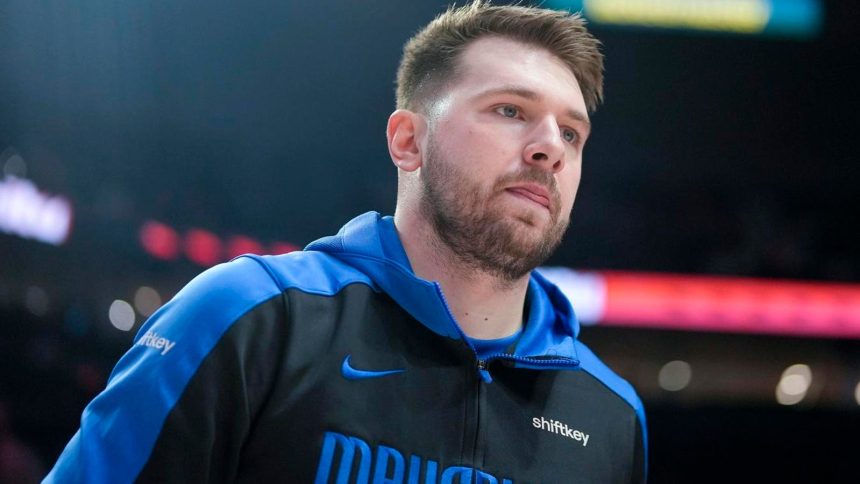The NBA world was rocked on a Saturday night that will forever be etched in basketball history. The Dallas Mavericks, in a move that defied all logic and precedent, traded their generational superstar Luka Doncic to the Los Angeles Lakers for Anthony Davis, Max Christie, and a solitary 2029 first-round draft pick. The shockwaves reverberated across the league, leaving fans, analysts, and even front office executives in disbelief. This wasn’t just a trade; it was a seismic event, a moment of such profound absurdity that it eclipsed even the most dramatic free agency decisions and blockbuster deals of recent years. The sheer improbability of a 25-year-old, five-time All-NBA First Team player, fresh off leading his team to the NBA Finals, being traded for such a meager return left everyone questioning the sanity of the Mavericks’ front office.
The context of this trade magnifies its stunning nature. Doncic, on the cusp of his 26th birthday, is already a statistical marvel, ranking second all-time in playoff scoring average behind Michael Jordan. His unique blend of size, scoring prowess, and playmaking ability makes him a walking top-five offense, drawing double and triple teams on a nightly basis. Players of this caliber, especially those on a trajectory to become all-time greats, are simply not traded. The Mavericks, however, not only traded him but did so without securing a haul of draft picks and young talent that would typically accompany such a move. They essentially gifted a generational player to one of their biggest rivals, receiving a depreciating asset in return. The lack of a competitive return package suggested a severe miscalculation, a move so baffling that many initially dismissed it as a hoax.
While Anthony Davis remains a valuable player, his injury history, age, and lack of Doncic’s playmaking ability made this trade a lopsided affair. Davis is a formidable defensive anchor and a skilled paint finisher, but he doesn’t possess the transformative offensive impact of Doncic. The Mavericks’ general manager, Nico Harrison, justified the trade by citing Davis’s defensive prowess and a “win-now” mentality. This rationale, however, seemed to ignore the Mavericks’ recent success. Just months prior, they had addressed their defensive needs through trades and subsequently made a deep playoff run, demonstrating that a strong defense could indeed coexist with Doncic’s offensive brilliance. The blueprint for success was already in place, making the decision to trade him even more perplexing.
Concerns about Doncic’s conditioning and commitment to his body were reportedly factors in the Mavericks’ decision. While these concerns may have been valid, the trade represented an egregious mismanagement of assets. Doncic was eligible for a supermax extension that would have secured his future in Dallas and provided the Mavericks with greater leverage in any potential future trade scenarios. By trading him prematurely, the Mavericks not only lost their franchise cornerstone but also forfeited the opportunity to maximize their return in a trade. They essentially sold low on the most valuable asset in franchise history, a decision that will likely haunt them for years to come.
The Mavericks’ handling of this trade was akin to a free agent choosing a team based solely on the quality of a restaurant meal, rather than considering the merits of each potential destination. With several days remaining before the trade deadline, there was no urgency to make such a drastic move. A rational front office would have explored all available options, initiated a bidding war, and waited for the optimal offer. Instead, the Mavericks seemingly settled on the first available deal, failing to even contact teams like Oklahoma City, who would have likely offered a substantial package of draft picks for a player of Doncic’s caliber.
The repercussions of this trade extend beyond the immediate loss of Doncic. The Mavericks have not only lowered their playoff ceiling but have also potentially damaged their reputation within the league. Trading a superstar without consultation sends a chilling message to future free agents, who may now be hesitant to commit to a franchise that has demonstrated a willingness to discard its most valuable players without warning. The only comparable historical precedent is the trade of Kareem Abdul-Jabbar to the Lakers in 1975. However, even that trade pales in comparison, as Abdul-Jabbar had specifically requested a move. The Doncic trade stands alone as a monument to shortsighted decision-making and a stark reminder of the importance of asset management in the NBA. The Mavericks, in their haste to address perceived flaws, have inadvertently created a far greater problem, jeopardizing their future and potentially setting their franchise back for years to come.



